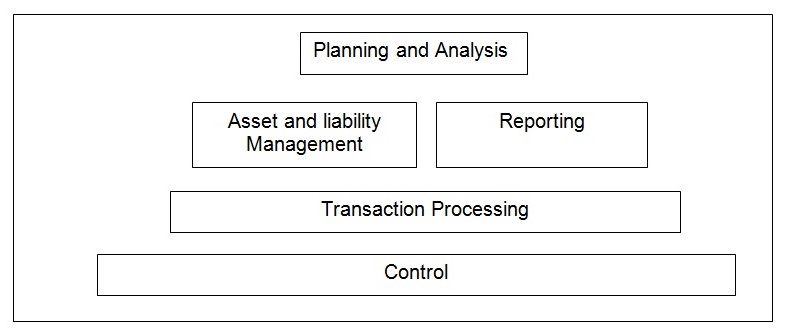Introduction
Public governance is generally regarded as one of the spheres of increased importance for the public sphere and the proper functioning of governmental tools. Originally, the necessity of the properly arranged public governance principles are explained by the fact, that public organizations generally do not have a properly centralized governing board, consequently, the public government practices are aimed to fill this gap and develop the public sector in general, and improve the governing principles of the decentralized sector.
The aim of this paper is to analyze the accountability and performance measurement of corporate governance in the public sector of Saudi Arabia, and define all the possible positive and negative sides of the public sector governance, and analyze the theories and models, applied for the governance process. Originally, there is a strong necessity to consider all the possible aspects of public governance and evaluate the formulation setting, and hypothesis, associated with the matters of public sector regulation and activity of the public organizations.
Accountability and Performance in Public Sector
The public governance sector in Saudi Arabia is generally featured with a clearly defined and robust framework. The fundamental aspects of the public sector, which are included in the governing principles are the following:
- Board committee charters
- Board Orientation and education
- Ethical business conduct principles
- Regular self-assessment (Barret, 2002)
Considering the fact, that the public governance sector is originally decentralized, these aspects provide the necessary tools for sector control and regulation. Thus, the aims of these aspects are stated in PriceWaterHouseCoopers (2007) and define the fact that the boards of the public sector should adopt and disclose all the necessary regulations in order to clarify the central objectives in order to regulate the accountability practices.
This is generally controlled by the means of annual work plans and the definition of meeting agendas for the boards and committees. (Smith, 2002). Additionally, the aspects of the control system are presented in the figure below.

Then, the board orientation phase starts. Orientation and education are required for the solution of the possible problems and to define the potentially dangerous moments of the public policy sector. As it is stated in Benz and Frey (2005, p. 74):
“At a minimum, the standardized orientation program should provide sufficient detail on the business operations and operating environment, governance, and financial literacy. In addition, the Board should provide ongoing professional development to ensure that members maintain or improve their skills, and continue to deepen their understanding of the organization and its operating environment.”
In the light of this statement, it should be emphasized that the original values of accountability and performance control in the public governance sector are closely associated with the necessity to maintain and improve the level of public performance. Moreover, considering all the possible demerits and failures of the public sector, some principles were taken from corporate governance. (Bridgman, 2007)
From this perspective, the ethical considerations and principles appear to be important and highly valuable. Originally, ethical behavior sets the tone of the communication processes within the public sector and defines the key values of the accountability tools. (Fourier, 2007)
As the representatives of the public sector are expected to reveal the high levels of professional conduct, and ethical behavior not only for maintaining sufficient communication levels but also for the constant improvement of the governmental practices and performance of the organizations governed. (Meliones, 2000) Consequently, boards should adopt the required practices and policies considering the ethical principles and regulations of the entire public governance sector.
As for the theoretic models of governance, Martins (2002) emphasizes the concept, that effective government regulatory policy should be originally responsive to the entire sector tendencies, and flexible enough to endure external factors. Thus, the entire model is closely associated with the necessity to reform the public sector. The choice of the models depends on the demographic tendencies of the society. Thus, the possible models may be:
- Governmental, which defines the regulation of the sector by government legislation
- Social, which is oriented at the social needs of the population
- Independent. This is the most effective, as it does not have to adapt to the governmental environment.
The model which is used for Saudi governance is mixed and entails governmental and social aspects of regulation. (Fourier, 2007)
Corporate Governance in Public Sector
The corporate governance principles are generally applied in the public sector for the improvement of the entire performance of the boards. By the world practices of corporate governance, the governance of the private sector strongly depends on the ethical considerations and principles of governance. As it was stated by Fleming and McNamee (2005, p. 67):
“Corporate governance can learn from the four cornerstones of public governance. First, it is argued that corporate governance can gain from realigning managers’ compensation with the practice prevalent in the public sector, namely fixed compensation not dependent on pay-for-performance. Them it is considered that the advantages of relying on the basic democratic idea of division of power in corporate governance. Finally, the rules of succession, which are prevalent in the political sphere, can be applied to devise better governance rules.”
In the light of this statement, it should be emphasized that the offers, associated with the matters of ethical corporate governance are applied in the public sphere, and presuppose the advanced argumentation system, aimed at arranging the institutionalized competition. (Department of Public Enterprises, 2002). The link between corporate and public governance is offered below.

From the economic and social point of view, the principles of corporate governance presuppose that the persons, who are involved in the public governance receive fixed salaries. This notion is based on the statement that these people will not have the motivation to manipulate their position. (Moon and Fitzgerald, 2006) Originally, this is the common practice for the public sector, additionally, they have the precise criteria which is used for the evaluation of their performance and which defines the level of the compensation. These practices were taken from the corporate governing strategies. (Muralidharan and Hamilton, 1999)
Another perspective of the public sector regulation is closely associated with the pay-for-performance principles. These are the business and economic perspectives of public sector governance. The main difficulty of this approach is explained by the fact that some aspects of the public activity can not be measured, thus, this originates the problem, that only those tasks are performed, which can be measured and compensated correspondingly.
As it is stated by Smith (2002, p. 120):
“In a politico-economic view, there are some more fundamental issues involved. Political economists have traditionally focused on politicians’ possibilities and incentives to manipulate the criteria by which they are evaluated. In this view, pay-for-performance for politicians and bureaucrats does not make sense, because they are the ones who decide over the very standards they are compensated by.”
Nevertheless, the corporate view of the public governance presupposes that these measures should have a fixed compensation level, and the fact, that these are not measured, presupposes that improved control should be implemented. (Timmer. 2000). Moreover, the political and economic perspective of the research question is closely linked with the matters of political environment and the regulation principles of the governmental model, which regulates the economic aspect of the public sector governance.
Accountability and Performance under the corporate governance in the public sector
The factors of corporate governance in the public sector presuppose the necessity of improved control and the values of the extended compensation system. Considering the fact, that some aspects of the public sector activity can not be measured, the fixed compensation presupposes the fixed performance. Nevertheless, the principles of corporate governance were implemented to overcome this barrier, and the extended control is aimed at improving the entire performance of the organization. (Meliones, 2000)
The factors of accountability presuppose the existence of strict vertical and reliable horizontal structure of the public sector organizations. In the light of this statement, it should be emphasized that the Saudi public sector is properly structured, and the delegation system is based on the diversified system of responsibility and the values of traditional responsibility allocation, associated with the network of tasks and assignments, applicable for all the departments and spheres of the public sector. (Malina and Selto, 2002) Originally, this system presupposes improved opportunities for control and accountability, as well as a diversified responsibility system, is aimed at arranging more effective compensation. (Martins, 2002)
Ethical considerations are among the most important aspects of accountability and performance in the public sector. Thus, it should be stated that the Saudi system is based on the principles of ethical traditions of the State, which are an integral part of the religious system and religious traditions. Thus, the higher positions are occupied by older workers, who are more experienced and have more privileges from the point of view of religion and social structure. (Muralidharan, 1997)
Conclusion
Finally, it should be emphasized that the traditions, associated with the public governance sector are mainly borrowed from the corporate sector governance principles and strategies. Most aspects of the public sector presuppose the fixed compensation principles. Additionally, these actions can not be measured fully, consequently, the workers lack sufficient incentive for improving their performance.
On the other hand, corporate principles of government helped to implement the more complex performance structure, and arrange the extended delegation system, as well as the responsibility allocation strategy. Thus, the governance of the public sector is closely linked with the traditions of the corporate sector. Moreover, the Saudi system can not be imagined without strong religious traditions, consequently, these aspects form the ethical aspect of public governance strategy.
Reference List
Barret, P., 2002. Achieving Better Practice Corporate Governance in the Public Sector. International Quality & Productivity Centre Seminar
Benz, M. Frey, B., 2005. Corporate Governance: What can We Learn From Public Governance? Institute for Empirical Research in the Economics University of Zurich. Academy of Management Review
Bridgman, P., 2007. Performance, conformance, and good governance in the public sector. Key Issues of Risk Management.
Department of Public Enterprises. 2002. Protocol on Corporate Governance in the Public Sector. Department of Public Enterprises Republic of South Africa
Fleming, S., McNamee, M., 2005. The Ethics of Corporate Governance in Public Sector Organizations. Public Management Review. 7: 1, 135-144
Fourier, D., 2007. Good Corporate Governance in Ensuring Sound Public Financial Management. School of Public Management and Administration University of Pretoria
Malina, M.A. and Selto, F.H. 2002. Communicating and Controlling Strategy: an Empirical Study of the Effectiveness of the Balanced Scorecard. Journal of Management Accounting Research, Vol. 13.
Martins, R.A. 2002. The Use of Performance Measurement Information As a Driver in Designing a Performance Measurement System. Research and Action Boston, USA, Centre for Business Performance, UK.
Meliones, J. 2000. Saving Money, Saving Lives. Harvard Business Review, 78: 6, pp. 57-67.
Moon, P. and Fitzgerald, L. 1996. Delivering the Goods at TNT: The Role of the Performance Measurement System. Management Accounting Research, 7: 4, pp. 431-457.
Muralidharan, R. 1997. Strategic Control for Fast Moving Markets: Updating the Strategy and Monitoring Performance. Long Range Planning, 30: 1, pp. 64-73.
Muralidharan, R. and Hamilton, R.D. 1999. Aligning Multinational Control Systems. Long Range Planning, 32: 3, pp. 352-361.
PricewaterhouseCoopers LLP., 2007. Corporate governance for public sector organizations. Trusted Advisor Briefing
Smith, M.J. 2002. Gaming Non-Financial Performance Measures. Journal of Management Accounting Research, pp. 119-133.
Timmer, H., 2000. Government Governance Corporate governance in the public sector, why and how? The Netherlands Ministry of Finance Government Audit Policy Directorate.